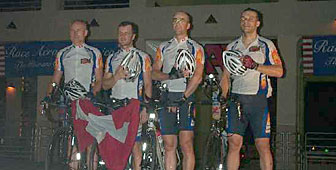Swiss cyclists come second in trans-American endurance test

Four Swiss cyclists have just completed one of the world's toughest sporting events - the 4,800-kilometre "Race Across America".
The Swiss team finished the mammoth distance last week clocking a time of six days, ten hours and seven minutes – good enough to land in second place of the four-rider team division.
For the four members of the Zurich-based Swiss Academic Ski Club team – made up of Urs König (34), Marc Russenberger (44), Urs Schmidig (33) and Jurg Schweizer (49) – the result was the culmination of almost two years of training and planning.
Home in one piece
König, a Seattle-based consultant from Zurich, said finishing the race with all riders still on their bikes had been the team’s priority.
But despite mastering the ride without any major mishaps – not counting an early wrong-turn that saw the team loose time – the race was brutal.
“You could just never, ever, really relax and stop. It just goes on forever,” König told swissinfo.
“You’re hitting day four or three and you haven’t slept, it’s three o’clock in the morning, it’s pouring rain and you know you’ve got to get out there and do a big hour’s ride and you’ve still got another two and half days,” he said.
“I guess that’s probably the hardest thing we all had to face.”
The team covered the distance using a rotating roster, based on a “28-hour-day”, that allowed one rider to have several hours rest in a support van, while the other three swapped one hour “shifts” on the road.
Hot, humid and long
For participants and their support crews, the Race Across America is a brutal endurance test.
The annual race sees cyclists pedal around the clock for up to 15 days after leaving the start line in Washington State on the United State’s west coast.
From there, the race crosses the Rocky Mountains and passes through the plains of the American mid-west to the beaches of Florida on the continent’s east coast.
Riders contend with scorching 30-degree heat and humidity of up to 90 per cent, as well as several 3,000-metre mountain passes.
And, unlike multi-stage professional races such as the Tour de France where riders can recover after each day’s efforts, the Race Across America is a non-stop battle against the clock.
As a result, riders are forced to cope with the debilitating effects of sleep deprivation, which in some cases sees them literally falling asleep on their bikes – usually with disastrous consequences.
Solo madness
Riders competing in the solo category often ride the race over nine to 15 days on less than three hours of sleep a night.
The physical cost is stark. Soloists suffer from hallucinations, swollen joints, back and neck pain, and some of the worst “saddle-rash” imaginable. It is not uncommon for participants to finish with deep lesions on their buttocks.
According to König, the Swiss team managed to avoid such deprivations – suffering more from intestinal troubles triggered by water loss than severely bruised buttocks.
“It [my backside] is not as bad as I expected it to be. Honestly. No, it’s fine,” he said.
“But you’ve got to drink gallons and gallons of water and your digestive system goes berserk.”
König was thrilled by his team’s success but was quick to point out that the four cyclists could not have done it alone.
“We had an excellent support crew,” he said.
by Jacob Greber

In compliance with the JTI standards
More: SWI swissinfo.ch certified by the Journalism Trust Initiative
You can find an overview of ongoing debates with our journalists here . Please join us!
If you want to start a conversation about a topic raised in this article or want to report factual errors, email us at english@swissinfo.ch.